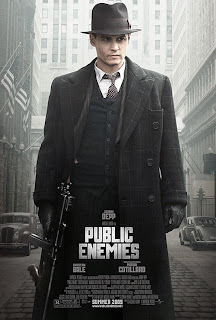 More often than not, when I have a problem with a Hollywood blockbuster, my primary gripe is with the script. We've all seen them: those big-budget, star-studded, action-packed, over-the-top fiascoes that fall flat because the writers were paid to shit something out as a jump-start to the process rather than worry about crafting anything that even remotely approaches worthwhile—movies that nevertheless make all the money they were meant to because the viewing public is dazzled into hollow satisfaction. Well, Public Enemies has different problems.
More often than not, when I have a problem with a Hollywood blockbuster, my primary gripe is with the script. We've all seen them: those big-budget, star-studded, action-packed, over-the-top fiascoes that fall flat because the writers were paid to shit something out as a jump-start to the process rather than worry about crafting anything that even remotely approaches worthwhile—movies that nevertheless make all the money they were meant to because the viewing public is dazzled into hollow satisfaction. Well, Public Enemies has different problems.At $100 million, Michael Mann's latest comes through with excellent costuming and set design. It would be hard to find a bigger pairing than Johnny Depp and Christian Bale, neither of whom disappoints, bringing the quality performances (and accents) I've come to expect. Though I wouldn't call the film action-packed, there's certainly no shortage of gunfire. (It is about a bank robber, after all.) Throw in French, Oscar-winning beauty Marion Cotillard and who can complain?
Where Public Enemies misses the mark is in the seemingly unlikeliest of places: lighting and cinematography (/ staging). It starts out innocently enough; the hand-held camera and oppressive yellow suit the opening prison-break (even if the shot framing Depp starkly against the blue sky as his car speeds away is a little strange). It's not until the plot slows down and Depp's John Dillinger finds himself in the dark ballroom where he will first meet his sweetheart (Cotillard), that we begin to realize darkness is obscuring some of the critical actions. As the couple dances we become aware of the over-use of close-ups, and as they dine we begin to wonder if the hand-held shake is really appropriate for every emotion. Later, when Bale's Melvin Purvis speaks to his team of investigators, we get our best view yet of how distracting all this mishandling can be as we watch the oddly cast shadows swim over his inappropriately sickly pallor.
If you want to know how the movie ends, I can't tell you. (I walked out.) I kept wanting the performances and story to carry me through, but the plot moved just slowly enough to be overwhelmed by the quick pans and low light (and was not helped along by staging that sometimes de-emphasized important movements). I just couldn't care anymore. The shots you saw in the trailer were the best the film had to offer, and they were too fast, too few and too far between to hold the story. I mentioned the sets, but in truth we weren't really allowed to appreciate their grandeur, washed-out and poorly framed as they unfortunately tended to be. With all the elegance of a Discovery Channel docu-drama, this film looked like it could have been shot in my back yard, so much so that as I walked home under the streetlights I felt like I was still trapped in the screen. Mann's unruly, ill-lit, gritty style may have been appropriate for the modern-day, late-night LA of Collateral, but falls well short of conveying the period romanticism that Public Enemies deserved.
The film isn't terrible, just unwatchable. For this story, send me the novelization.
This movie was a bit of a disappointment to me as well. I agree with your assessment that the handheld camera was not always appropriate, and that there were far too many close-ups. Though I understand this is supposed to be a film about a guy, and it focuses in on his life, I think it was too compressed by the camera frame. The cinematography did not "convey the period of romanticism" at all. I wanted there to be even more fascination and admiration for these men who stole from fat banks--something the poverty-stricken public really dreamt about.
ReplyDeleteI did enjoy the shootout at Little Bohemia, and the actor playing Baby Face was pretty great. The performances were all fine, but nothing heartbreaking save for a moment or two at the end. The plot didn't drive like I would have liked; it sort of meandered around this weird love story that I never really got attached to.
You say you walked out? I stayed all the way to the end, and was rewarded with the best scene of the movie. The last 20 minutes or so very high quality. I guess the opening sequence was nice too, but the end had an artistry that wasn't seen elsewhere.
All in all I agree with your assessment of the film. You keenly observed the unnecessarily dim lightning, which I didn't notice on my own but now realize that it did distract from my experience.